
China, officially the People's Republic of China (PRC), has full diplomatic relations with 180 out of the other 192 United Nations member states, Cook Islands, Niue and the State of Palestine. As of 2024, China has had the most diplomatic missions of any state.
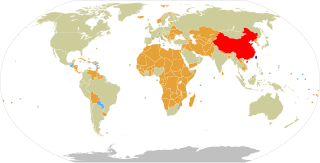
Foreign relations of the Republic of China (ROC), more commonly known as Taiwan, are accomplished by efforts of the Ministry of Foreign Affairs of the Republic of China, a cabinet-level ministry of the Government of the Republic of China. As of January 2024, the ROC has formal diplomatic relations with 11 of the 193 United Nations member states and with the Holy See, which governs the Vatican City State. In addition to these relations, the ROC also maintains unofficial relations with 59 UN member states, one self-declared state (Somaliland), three territories (Guam, Hong Kong, and Macau), and the European Union via its representative offices and consulates. In 2021, the Government of the Republic of China had the 33rd largest diplomatic network in the world with 110 offices.
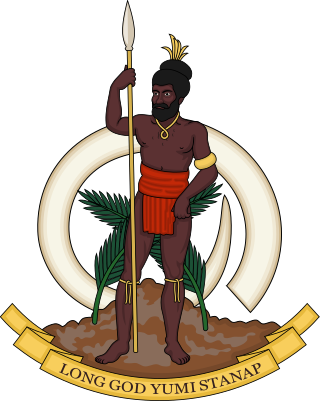
Vanuatu maintains diplomatic relations with many countries, and it has a small network of diplomatic missions. Australia, France, Japan, New Zealand, the People's Republic of China, South Korea and the United Kingdom maintain embassies, High Commissions, or missions in Port Vila. The British High Commission maintained a continued presence for almost a century, though closed from 2005 until reopening in 2019.

Nauru became a sovereign, independent republic on 31 January 1968, following the passage of the Nauru Independence Act 1967 by the Parliament of Australia and the end of its status as a United Nations Trust Territory. Nauru has established diplomatic relations with a number of nations, including most of its Pacific neighbors with which it maintains economic, cultural and administrative ties.

Rialuth Serge Vohor was a Vanuatuan politician. He hailed from the largest island of Vanuatu, Espiritu Santo, from Port Olry.
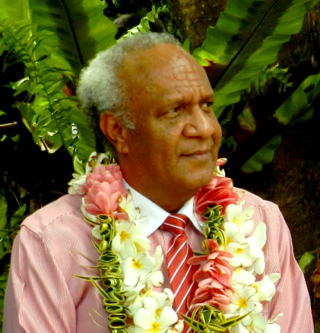
Meltek Sato Kilman Livtuvanu is a Vanuatuan politician who served as the Prime Minister of Vanuatu on four previous occasions, most recently from 4 September to 6 October 2023. he was previously prime minister from December 2010 to April 2011, from May to June 2011 and June 2015 to February 2016, though his premiership was subsequently annulled by a court of law.

Oceania is, to the People's Republic of China and the Republic of China, a stage for continuous diplomatic competition. The PRC dictates that no state can have diplomatic relations with both the PRC and the ROC. As of 2024, eleven states in Oceania have diplomatic relations with the PRC, and three have diplomatic relations with the ROC. These numbers fluctuate as Pacific Island nations re-evaluate their foreign policies, and occasionally shift diplomatic recognition between Beijing and Taipei. The issue of which "Chinese" government to recognize has become a central theme in the elections of numerous Pacific island nations, and has led to several votes of no-confidence.

India and Republic of China (ROC) had formal diplomatic relations from 1942 to 1949. After severing diplomatic relations, the bilateral relations have improved since the 1990s, despite both countries not maintaining official diplomatic relations. India only recognises the People's Republic of China (PRC) since 1949. However, India's economic and commercial links as well as people-to-people contacts with Taiwan have expanded in recent years.

China-Niuean relations are relations between China and Niue.
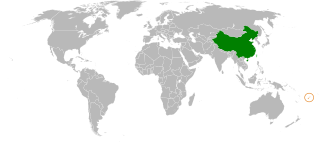
The Republic of the Fiji Islands was the first Pacific Island country to establish diplomatic relations with the People's Republic of China, in 1975. China established an embassy in Fiji in 1976, and Fiji opened its embassy in China in 2001.

The Republic of Kiribati and the People's Republic of China (PRC) established diplomatic relations on June 25, 1980, and resumed on September 27, 2019. Between 2003 and 2019, The government of Kiribati recognized the Republic of China, and, in accordance with the "One China" policy, the People's Republic of China did not have diplomatic relations to the country.
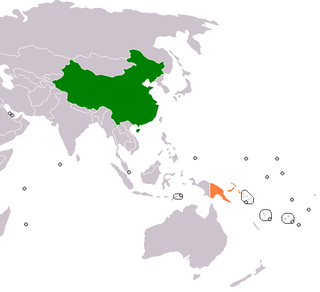
The Independent State of Papua New Guinea and China (PRC) established official diplomatic relations in 1976, soon after Papua New Guinea became independent. The two countries currently maintain diplomatic, economic and, to a lesser degree, military relations. Relations are cordial; China is a significant provider of both investments and development aid to Papua New Guinea.

Samoa and China (PRC) established official diplomatic relations in 1976. The two countries currently maintain cordial relations; China provides economic aid to Samoa.

Tonga and China (PRC) established official diplomatic relations in 1998. The two countries maintain cordial diplomatic, economic, and military relations.

Relations between Barbados and China began on 4 September 1967 with Barbados recognizing the People's Republic of China from 30 May 1977, just over one decade after the eastern Caribbean island nation's independence from the United Kingdom.

Diplomatic relations between China and the Federated States of Micronesia were established on September 11, 1989. The Chinese government first established an embassy in the capital of Palikir in 1990, and dispatched its first ambassador in 1991. Initially, the Micronesian ambassador to Tokyo, Japan also served as Micronesia's ambassador to China, before Micronesia established an embassy in Beijing in 2007. President John Haglelgam was the first senior government agent from Micronesia to visit China, doing so in 1990. The current Chinese ambassador to Micronesia is Zhang Weidong, while the Micronesian ambassador to Beijing is Akillino H. Susaia.

The Vanuatu passport is an international travel document issued to Vanuatu citizens.
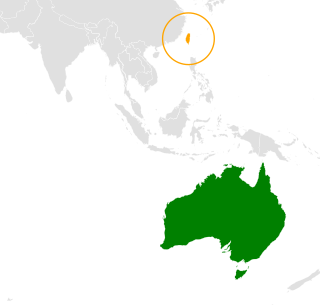
Relations between the Commonwealth of Australia and the Republic of China, formerly the Qing dynasty, date back to 1909. The two countries had official diplomatic relations from 1941 to 1972. Since 1972, Australia no longer has formal diplomatic relations with Republic of China (Taiwan). Australia and Taiwan share partnership in the inter-governmental Global Cooperation and Training Framework (GCTF) activities.

China–Nauru relations are relations between the People's Republic of China and the Republic of Nauru. The Republic of Nauru and the People's Republic of China established diplomatic relations on 21 July 2002, and resumed on 24 January 2024. Between 2005 and 2024, The government of Nauru recognized the Republic of China, and, in accordance with the "One China" policy, the People's Republic of China did not have diplomatic relations to the country.

Nauru–Taiwan relations are relations between the Republic of Nauru and the Republic of China (Taiwan). Official diplomatic relations were first established in 1980. Relations were first severed in 2003, when Nauru opted to recognize the People's Republic of China. Formal bilateral relations with Nauru were reestablished in 2005, and maintained until 2024.




















